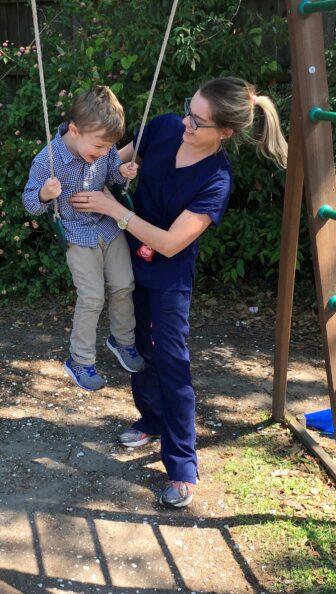
Most of us are aware that Louisiana is facing a budget crisis and that our legislators will soon be meeting in Baton Rouge to start dealing with it.
Until recently, I was, like many people, unaware that the areas of the budget most vulnerable to deep cuts are education and healthcare. Many other spending areas are written right into the state constitution, which makes it impossible to share the burden equitably across departments.
Families of children with autism spectrum disorder have already been notified that services they need are likely to be severely cut.
Imagine telling that to Todd and Joy Weiskopf, whose children, Ava, 4 ½ and Laila, 2 ½, were diagnosed with autism spectrum disorder as toddlers.
Both girls face daily challenges, ranging from dressing and feeding themselves and using the bathroom independently to not being able to communicate their wants and needs consistently. The Weiskopfs rely on access to evidence-based applied behavior analysis services. It is a time-intensive treatment rooted in learning theory that seeks to improve socially significant behaviors through interventions that have been proven to work. As countless peer-reviewed journal articles attest, these treatments are the best way to maximize a child’s potential to become an independent adult.
They are also costly. According to a 2014 study made available to Autism Speaks, the lifetime cost for an individual with autism averages between $1.4 million and $2.4 million. For most patients, the annual cost of services runs anywhere from $15,000 to $35,000 per patient.
However, with necessary therapy, there is hope. Children who receive applied behavior analysis therapy in early intervention can transition into the public school system with little or no additional support. They also grow up to live as independent adults and contribute to their community.
Until recently, hundreds of Louisiana families with children affected by autism spectrum disorder have had the comfort of knowing that their child’s treatment is protected by both a federal consent decree and a state mandate.
It would make so much more sense for state legislators to realign state priorities and sustain funding for autism services rather than spending time and money on a court fight to overturn the consent decree.
In 2008, the Louisiana legislature passed House Bill 958, which mandated health insurance coverage by private insurance carriers for the diagnosis and treatment of autism spectrum disorder, including applied behavior analysis. In 2012, Louisiana House Bill 771 was passed expanding coverage to include children through the age of 21 and removing a lifetime benefits cap. In 2014, Louisiana Medicaid was mandated to cover applied behavior analysis services based on the court ruling Chisholm v. Kliebert.
Simply put, the consent decree and the state mandate create an obligation for the State of Louisiana and commercial insurers to ensure that children with autism have access to these life-changing services.
Recently, the state’s largest commercial insurer and Louisiana Medicaid slashed reimbursement rates by 25 percent, forcing health care providers to make gut-wrenching decisions. Some services were discontinued while others face curtailment, no matter how large the case load or urgent the needs of patients, many of them younger than six years old.
Ava and Laila have been receiving one-on-one therapy with a board-certified behavior analyst for 30 hours a week. Many patients also benefit from having speech and occupational therapists on their treatment teams.
Applied behavior analysis practitioners are highly educated professionals with advanced degrees, trained to address socially significant behaviors, including functional communication, adaptive living skills, academic skills, social skills and problem behaviors, including self-injurious behaviors.

As we dedicate our lives to preserving and expanding access to autism treatment, the Louisiana Department of Health is instead gearing up for a legal battle to sidestep the consent decree and escape its legal obligation to children with autism spectrum disorder and their families. The wait list for Medicaid services for Louisiana children with autism is already far too long. Children can be on multiple wait lists for up to two years.
The sad reality is that researched-based applied behavior analysis therapy cannot be sustained at the lower reimbursement rates. Without access to autism treatment, the behavioral and financial challenges and frustrations will only increase for Louisiana families and school districts. The investment for families is substantial but, by helping persons with autism live productive, healthy lives, the gain for all of us is immeasurable.
It would make so much more sense for state legislators to realign state priorities and sustain funding for autism services rather than spending time and money on a court fight to overturn the consent decree. It is the right thing to do, both in terms of economics and the law. Most importantly, it is the humane response to at-risk children struggling to lead fuller, more independent lives.
With the legislative session looming, now is the time to stand up for Louisiana children with autism spectrum disorder. Join with us by voicing your opposition to recent and threatened cuts to autism-related medical and behavioral services. Contact your state representatives. In addition, share, “like,” post, and retweet images and infographics on social media aimed at generating broad support for this very important issue. #JoinLCAAS because #CoverageMatters.
Kelly Spears, of the Spears Learning Center, is a board-certified behavior analyst and speech language pathologist. She is a founding member of the Louisiana Coalition for Access to Autism Services, formed in late 2016 in response to threatened cuts to autism-related medical services.
The opinion section is a community forum. Views expressed are not necessarily those of The Lens or its staff. To propose an idea for a column, contact Lens founder Karen Gadbois.


